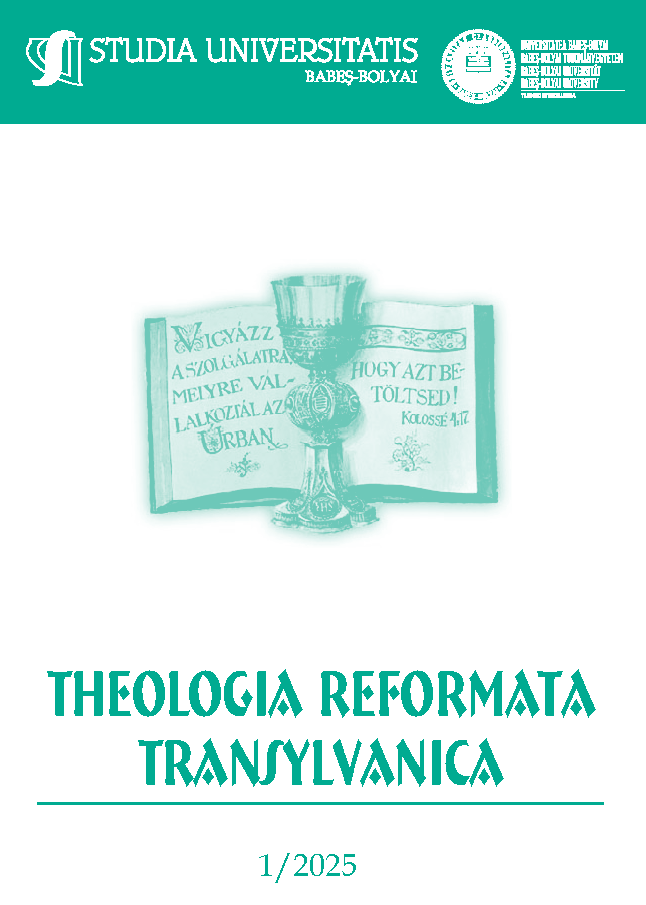Reformáció, társadalomszemlélet, demokrácia – Gálfy Zoltán olvasatában…
DOI:
https://doi.org/10.24193/subbtref.70.1.03Keywords:
research on the history of the Reformation, church and society, contextualization, theological judgementAbstract
Reformation, Social Theory, Democracy – In the View of Zoltán Gálfy... The study examines a topic in the work of the church historian Zoltán Gálfy (1924–2013): how the renowned professor from Cluj-Napoca interpreted the impact of the Reformation on the life of the society, with special regard to its democratic features, what social dynamics influenced the development of the Reformation in the 16th century, and what consequences had the renewal of faith on the environment of the church. The paper compares the work of the young theologian, only 25 years old, with his later writings under the communist-socialist regime and his scholarly achievements after the change of regime in 1989/90. It can be concluded that Gálfy, in the face of the danger of contextualizing theological scholarship, reached conclusions that are still relevant today. For example, the recognition he often makes – in line with recent European Reformation scholarship – that the Reformation has brought radical changes in four areas: the interpretation of the Bible, the personal experience of faith, the definition of the function of the church, and the relationship of Christianity to the world. In conclusion, Gálfy’s contribution should be seen as emphasizing that, despite all the social influences and counter-effects, it is useful to pay attention to the theological dimensions of the Reformation, to a careful reading of the original sources, and to the fact that “it is not a question of moving into the Reformation building but of rebuilding it in every age”, i.e. that each generation should come to an actualization of the Reformation heritage in its own context.
References
*** „Amit az evangélium ígér, azt váltsa valóra a demokrácia”. Részlet a református püspökök közös pásztorleveléből (1945), In: Élet és Jövő. 12. 1.
*** Püspökeink az állam és egyház viszonyainak alakulásáról (1947), In: Sárospataki Református Lapok. 42. 4.
ADORJÁNI Zoltán (2013a): D. dr. Gálfy Zoltán írásai, In: Református Szemle. 105. 698‒704.
(2013b): Commemoratio D. dr. Gálfy Zoltán emlékére (Mezőbánd, 1924. okt. 6. – Kolozsvár, 2013. okt. 15.), In: Református Szemle. 106. 695‒697.
BARCZA József (1993): Révész Imre püspök és az 1944-45-ös változások, In: L. Nagy Zsuzsa ‒ Veress Géza (szerk.): Történeti Tanulmányok (A KLTE Történelmi Intézetének kiadványa, II. kötet). Debrecen, KLTE. 125‒134.
BARTH, Karl (1948): Die christliche Gemeinde im Wechsel der Staatsordnungen. Dokumente einer Ungarnreise. Zollikon-Zürich, Evangelischer Verlag Ag.
(1961): Die Kirche zwischen Ost und West (1949), In: uő.: Der Götze wackelt. Zeitkritische Aufsätze, Reden und Briefe von 1930 bis 1960. Berlin, Käthe Vogt Verlag. 124−143.
BECKER, Judith (2014): Die Rolle der Obrigkeit in reformierten Kirchenordnungen in der Frühen Neuzeit, In: Heinrich Wall (szerk.): Reformierte Staatslehre in der Frühen Neuzeit (Historische Forschungen, 102). Berlin, Duncker & Humblot. 268−296.
BERNHARD, Jan-Andrea ‒ LEU, Urs B. ‒ ČIČAJ, Viliam (2024): Wissenstransfer. Der Einfluss des Schweizer Buches auf Ost- und Westeuropa in der Zeit des Ancien Régime. Zürich, Theologischer Verlag.
DINGEL, Irene (2014): Integration und Abgrenzung. Das Bekenntnis als Ordnungselement in der Konfessionsbildung, In: Irene Dingel – Armin Kohnle (szerk.): Gute Ordnung: Ordnungsmodelle und Ordnungsvorstellungen in der Reformationszeit. Leipzig, Evangelische Verlagsanstalt. 11−30.
ERDŐS Kristóf (2011): A Magyar Köztársaság és a Magyarországi Református Egyház 1948-as egyezményének vizsgálata, In: J. Újváry Zsuzsanna (szerk.): Összekötnek az évezredek. Budapest ‒ Piliscsaba, PPKE ‒ Szent István Társulat. 310–331.
FAZAKAS Sándor (2000): „Új egyház felé?” A második világháború utáni református egyházi megújulás ekkléziológiai konzekvenciái (Dissertationes Theologicae 4). Debrecen, Debreceni Református Hittudományi Egyetem.
(2020): A reformatio vitae jegyében. Tanulmányok a reformátori teológiatörténet, egyháztan és politikai etika tárgykörében. Kolozsvár, Bolyai Társaság ‒ Egyetemi Műhely Kiadó.
GÁLFY Zoltán (1949): A Reformáció. Különös tekintettel demokratikus vonásaira, In: Református Szemle. 44. 417–429.
(1950): Reformációra..., In: Református Szemle. 45. 245–249.
(1984a): Az egyházközségi élet betagolódása a helyi társadalom életébe, In: Református Szemle. 77. 211‒214.
(1984b): Köztársaságunk évfordulójára, In: Református Szemle. 77. 385‒386.
(1986): Az ifjú Kálvin [az 1536-os Institutio 450 éves évfordulójára írt tanulmány], In: Református Szemle. 79. 219–226.
(1991): A reformációról ma, In: Református Szemle. 84. 363–367.
(1992): Kálvin Ordonances ecclesiastiques című műve és hatása, In: Református Szemle. 85. 353‒358.
(1994): Kálvin Ordonnances-i és a theokrácia, In: Theologiai Szemle 36. 274–279.
GÁLFY Zoltán ‒ ESZENYEI Gyula (1984): Románia felszabadulásának 40 éves évfordulóján.
A lelkészértekezletek ünnepi gyűléseinek általános témája, In: Református Szemle. 77. 279–285.
HONECKER, Martin (1995): Grundriß der Sozialethik. Berlin ‒ New York, Walter de Gruyter.
KÁDÁR Tamás ‒ MIHÁLY Lehel ‒ SEBESTYÉN Előd ‒ ROTH Levente (2002): A kolozsvári Protestáns Teológia élete 1950–1955 között (Erdélyi Református Egyháztörténeti Füzetek 10). Kolozsvár, Kolozsvári Protestáns Teológiai Intézet.
KÁLVIN János (2014): Institutio. A keresztyén vallás rendszere. 1559. II. kötet. Budapest, Kálvin Kiadó.
KÖPECZI Béla (1986): Erdély a szocialista Romániában, In: Szász Zoltán (szerk.): Erdély története. Harmadik kötet: 1830-tól napjainkig. Budapest, Akadémiai Kiadó. 1759‒1778.
LÉSZAI Lehel (2004): Gálfy Zoltán életrajza, In: Lészai Lehel (szerk.): Emlékkönyv Gálfy Zoltán 80. születésnapjára. Kolozsvár, Az Erdélyi Református Egyházkerület kiadása. 5‒7.
NAGY Géza (1995): A Kolozsvári Református Theologiai Fakultás története. Kolozsvár, Az Erdélyi Református Egyházkerület kiadása.
RÉVÉSZ Imre (1946): Magyar köztársaság, In: Debreceni Protestáns Lap. 66. 6.
SAUTER, Gerhard (1993): Zu diesem Heft, In: Verkündigung und Forschung. 38. 1–2.
VÁLYI NAGY Ervin (1993): Gott oder Geschichte? Über die Prämissen der heutigen reformierten Kirchenführung in Ungarn (1955), In: Verkündigung und Forschung. 38. 3–14.
Downloads
Published
How to Cite
Issue
Section
License
Copyright (c) 2025 Studia Universitatis Babeș-Bolyai Theologia Reformata Transylvanica

This work is licensed under a Creative Commons Attribution-NonCommercial-NoDerivatives 4.0 International License.



